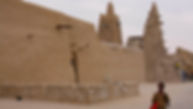
About The Timbuktu Renaissance
For most people, the name Timbuktu conjures images of an imaginary place at the edges of the Earth. While it’s true that Timbuktu is remote, it is far from mythic. The ancient city in northern Mali was for centuries a vibrant crossroad of trade, culture, scholarship and religious tolerance. It was home to Africa’s premier music festival, a priceless collection of manuscripts and one of the world’s greatest universities.
Unfortunately, today Timbuktu also calls to mind the destructive threat of violent extremism. Armed groups including al Qaeda-linked jihadists invaded the country and occupied Timbuktu in 2012, committing grave human rights abuses, damaging sacred shrines, torching thousands of manuscripts, banning books, sports and music – the very lifeblood of the country. A coalition of forces liberated Timbuktu and drove out the terrorists, but the peace remains fragile. The economy – mostly based on artisan crafts, commerce, and tourism – remains in tatters.
In alliance with the Brookings Institution and the Government of Mali, Timbuktu Renaissance is a platform that aims to leverage Mali’s, and in particular Timbuktu’s, rich culture and heritage to promote tolerance and jump-start wealth creation and resilience. The initiative seeks to boost Mali’s creative industries, such as tourism, literature, architecture, music, film and art, as well as mobilize investment for sustainable economic development in areas including education, agriculture, renewable energy and natural resources.
.png)